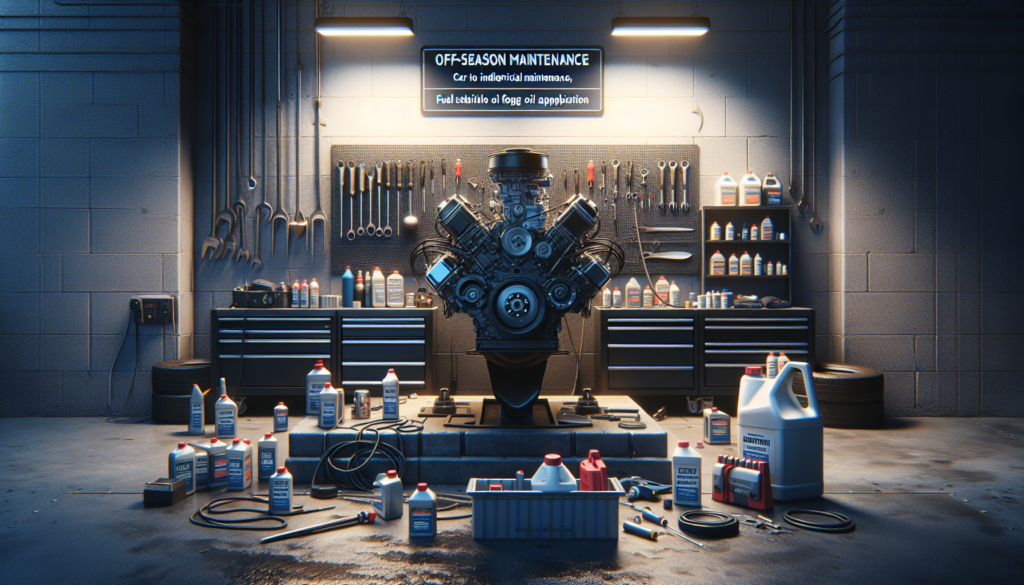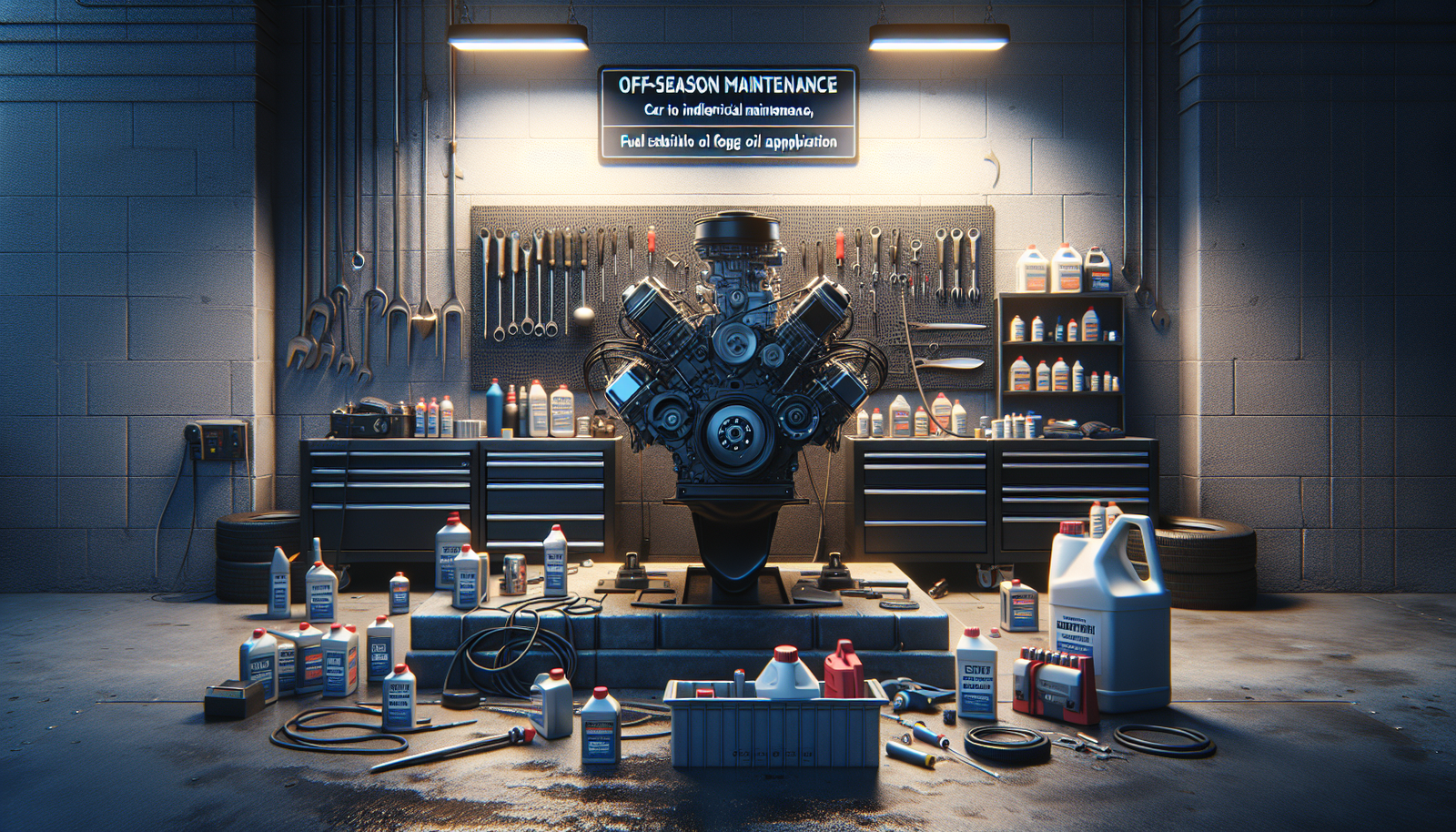As you kiss the beautiful boating season goodbye, it’s an undeniable fact that upkeeping your aquatic joyride involves more than a quick wipe down and wheeling it into storage. This article is all about ensuring your beloved watercraft remains in prime condition during off-season storage by focusing on the heart of your vessel – the engine. “Essential Boat Engine Maintenance Tips for Off-Season Storage” has been written with the intention to provide you with a thorough guide on how to protect, clean, and carry out necessary care to extend your boat’s engine life. Whether you’re an experienced sailor or a novice boat owner, you’ll find invaluable advice to keep your investment safe and ready for next season’s action.

Why Should You Properly Store Your Boat Engine During Off-Season
Storing your boat engine properly during the off-season is an integral part of boat maintenance. Many people may not realize this, but your boat’s engine needs as much care as any other part of your boat.
The importance of off-season engine maintenance
The off-season is a great time to give your engine the care and attention it deserves. Regular maintenance can prolong the life of your boat engine, reduce repairs, and ensure that your boat is ready to go when boating season rolls around. Performing regular off-season maintenance can not only save you money in the long run but can also enhance performance and safety.
Potential risks of improper storage
Improper storage of your boat engine can trigger a host of mechanical and structural problems. For instance, it can lead to corrosion, rust, accumulation of dirt and grime, and may cause engine components like hoses, seals, and gaskets to crack or dry out. All of these can compromise engine performance and ultimately shorten the engine’s lifespan.
Benefits of proper off-season storage
On the other hand, proper off-season storage comes with several benefits. It helps to prevent mechanical failure and protects your engine from unwanted damage and deterioration. It ensures your boat engine is in peak condition for the next boating season, providing you with the satisfaction of a seamless and enjoyable boating experience.
Understanding Your Boat Engine
To properly store your boat engine in the off-season, it’s important to understand how it works, its different components and how the seasons affect it.
Types of boat engines
There are different types of boat engines. There are outboard engines, which are on the outside of the boat, and inboard engines that are mounted inside the hull of the boat. There are also stern drive engines, inboard/outboard (I/O) engines and jet drives. Each engine type has its own unique maintenance needs, which you should be aware of when preparing for off-season storage.
Functional components of the boat engine
Boat engines comprise different functional components, including the engine block, which is the main body of the motor, the alternator, which charges the boat’s battery system, and the propeller. Other important components include engine belts, cooling system, oil filter, and spark plugs.
How different seasons affect your boat engine
Seasonal changes can also affect your boat’s engine. For instance, during winter, freezing temperatures can cause cracking in the engine block. During autumn, falling leaves can clog up air filters and other engine parts. Knowing this, you can take preventative measures to protect your engine during storage.
Preparing for Off-Season Storage
Off-season storage preparation begins long before the boating season ends.
When to start preparing for off-season storage
It is best to start preparing for off-season storage early, even before the end of your boating season. This will give you ample time to carry out necessary inspections and ensure all necessary materials and tools are in place before the storage process begins.
List of tools and materials needed
Ensure you have all necessary items for off-season storage, including cleaning agents, fresh oil, oil filter, antifreeze, fuel stabilizers, anti-corrosion sprays, and lubricants. Additionally, you’ll need some tools like a wrench, water hose, and possibly engine fogging oil.
Checking the condition of your boat engine
Before storage, do a thorough check on the condition of your boat engine. Check for any signs of wear and tear, leaks or any other abnormalities. Addressing these issues before storage can prevent minor problems from becoming big issues during the storage period.

Draining and Cleaning Your Boat Engine
Draining and cleaning your engine is another essential aspect of off-season storage.
Steps for draining the boat engine
Firstly, you should drain your engine to remove any remaining water. The method will depend on the type of engine. For some engines, this simply involves running the engine until it reaches its operating temperature, then turning off the engine and draining the coolant.
Importance of thoroughly cleaning your engine
Cleaning your boat engine can remove dirt, grime, and salt, which can cause corrosion and damage if left over time. It also gives you the opportunity to inspect your engine closely for any existing or potential issues.
Using appropriate cleaning agents
Remember to use appropriate cleaning agents for your engine. Some cleaning agents can cause damage to certain engine components. If you are not sure what type of cleaning agent to use, consult your boat manufacturer’s guidelines.
Protecting the Engine
Protecting your engine during off-season storage ensures that your engine is shielded against potential damage.
Using anti-corrosion sprays
Anti-corrosion sprays are great for protecting your engine from rust and corrosion. Spray it on all exposed metal parts of the engine to create a protective layer that keeps away moisture and air, which triggers rusting.
Importance of Lubricating the engine
Engine lubrication reduces friction between moving parts in your engine, preventing wear and tear. Using a fogging oil can protect the internal components of your engine from rust and corrosion during storage.
How to properly seal your engine
Sealing your engine is another way to protect it from the harsh outside environment. You can use engine covers or bags to prevent dust and dirt from getting into the engine.
Fuel and Oil Maintenance
Fuel and oil maintenance is another important aspect of off-season boat storage.
The significance of changing the oil before storage
Changing the oil before storage is important because old oil contains acids that can cause corrosion. Hence, the oil should be changed right before storage.
How to properly dispose of old oil
Disposing of old oil properly is crucial to avoid polluting the environment. Contact your local recycling or hazardous waste facility to know the appropriate way to dispose of old oil in your area.
Handling the fuel system
You should also top up your fuel tank to prevent moisture build-up, which can cause rusting. Additionally, adding a fuel stabilizer can prevent the fuel from destabilizing and forming a varnish or gum-like layer that can clog your fuel system.
Battery Care During Off-Season Storage
Caring for your battery during off-season storage is important to increase its lifespan and save on replacement cost.
Disconnecting and removing the battery
Before you store your boat, disconnect and remove the battery. Leaving the battery connected can lead to a power drain which may cause the battery to fail.
Proper battery storage guidelines
Store your battery in a clean, dry, cool place away from heat and direct sunlight. If it’s a lead-acid battery, store it on a battery tender or charger to maintain the charge.
Battery maintenance tips
Regularly inspect your battery’s charge level and top it up if necessary. Also, clean the battery terminals with a brush to remove rust or corrosion.
Inspecting and Maintaining Engine Belts
Engine belts are critical parts of your boat engine. Therefore, their inspection and maintenance should not be overlooked.
The role of engine belts
Engine belts play a vital role in driving various engine components like the alternator, water pump, and power steering pump. Therefore, keeping them in good condition is crucial for your boat engine to function efficiently.
Signs of worn out engine belts
Check your engine belts for any signs of wear such as cracks, fraying, or glazing. If you notice any of these signs, replace the belts immediately.
Replacing or adjusting engine belts
If your belts are in good condition but not properly adjusted, you can tighten them to the recommended tension. If they are worn out, replace them.
Thorough Inspection for Damages
Before you store your boat, conduct a detailed inspection of the engine to identify any potential damages.
Checking for leaks
Check for leaks in the engine, fuel system, and other areas of your boat. Leaks can lead to serious damage and should be addressed immediately.
Identifying signs of wear and tear
Look for signs of wear and tear in the engine compartments and address them right away. Early detection can prevent minor issues from turning into major problems.
Importance of professional inspection
If you feel overwhelmed or unsure about conducting an inspection yourself, it’s worth hiring a professional. They can detect problems that may not be visible to the untrained eye and help you properly prepare your boat for off-season storage.
Storage Options for Off-Season
Once you have prepared your boat engine for the off-season, it’s time to consider where to store it.
Using boat covers
Boat covers are helpful for protecting your boat against dust, rain, snow, and harmful UV rays. Whether you’re storing your boat indoors or outdoors, a good quality cover can go a long way in preserving the condition of your boat.
Advantages of indoor storage
Indoor storage offers the best protection against harsh weather conditions. If you have space, consider storing your boat in a garage or shed. If not, consider renting a storage space.
How to properly use outdoor storage
If indoor storage is not an option, outdoor storage is also fine, as long as you take necessary precautions. Always use a boat cover and store the boat off the ground, if possible. Also, store the boat in a secure place to prevent theft.

